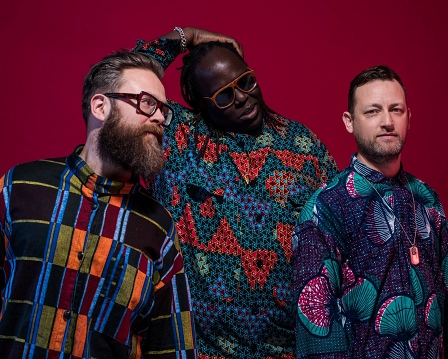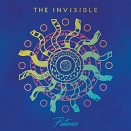Erstellt am: 30. 6. 2016 - 14:13 Uhr
"People have a fear of expressing their beliefs"
Angesetzt war das Interview mit Dave Okumu am Wahltag zum EU-Referendum. Erreicht haben wir uns dann aber doch nicht. Seine Band, zu der ich schließlich verzweifelt versucht habe eine Verbindung aufzubauen, heißt The Invisible und das neue Album "Patience". Es war ein einsames Warten. Das neue Album der Band, das mir am Tag dieses Wartens auf das Brexit-Ergebnis noch als Soundtrack für den in mir schimmernden Optimismus diente, veränderte seine Wirkung.

The Invisible

The Invisible / Ninja Tune
"Patience" von The Invisible ist auf Ninja Tunes erschienen.
Als ich den Musiker beim Nachholtermin endlich erreiche, ist unsere Welt ein Stück ungewisser geworden. Bei jedem Refresh-Klick sehe ich neue Meldungen, die etwas anderes sagen, als noch vor einer Stunde. Bei meinen schottischen Freunden herrscht Frustration und Ungewissheit, von meinen irischen Freunden lasse ich mir die Geschichte des Nordirlandkonfliktes nochmal erklären. Mit London bin ich durch Dave Okumu verbunden.
"I don't wanna face the world today!"
Dave Okumu ist als Sohn kenianischer Einwanderer in Wien geboren, er hat in Schottland studiert und wohnt in London. Er ist Komponist, Produzent und Sänger, Songwriter und Gitarrist bei The Invisible. Jene Band, die er mit seinen beiden langjährigen Freunden Tom Herbert und Leo Taylor vor zehn Jahren gegründet hat.
Dave sitzt in seinem "study room" und meint, es wäre komisch, wenn wir nicht über Brexit reden würden. Wir reden allerdings nicht über die möglichen Auswirkungen auf das Tour-Leben seiner Band, über Einreiseformulare, Zollbestimmungen oder über Kulturförderungen. Auch die xenophoben Übergriffe per Flugblatt in London oder per Zeigefinger in Manchester besprechen wir nicht. Soweit kommen wir gar nicht. Wir können uns noch nicht ausmalen, wie die nächsten Tage, Wochen, Monate ausschauen werden. Wir versuchen uns zu erklären, wie es überhaupt so weit kommen konnte. Wir. Also Dave Okumu. Ich höre zu und sage "a horror came true".
"It's very depressing on many levels. I woke up that morning and I felt a deep sadness. It was like having to pull myself out of a depression, really. Just to get going sometimes in those mornings when you're like "Oh god this is aweful! I don’t wanna face the world today!" and I suppose having spent the last few days in deep thought about what's happening and the chaos around us and the lack of confidence in our leadership and in our political system, I've been reflecting on a lot of different things.
I think most of all there's a yearning for the truth. It feels like this situation that we find ourselves in is a product of very deep suited problems that go back much further than the discussion about this referendum. I think this is about a lack of engagement, it's about division in our society, it's about an inability in contemporary culture or complacency when it comes to having complex discussions around issues.
My personal view is that there is a very important conversation to be had about Britain’s role in Europe and whether or not it should have remained in the European Union but that conversation has been hijacked by other agendas. I don’t think it's just this country but I feel it has to do with an inability or an unwillingness to have more complex conversations about human existence.
That makes me feel really sad but there's also the part of me - the optimistic side - that feels that when disaster strikes even if the reasons are confusing, at least it's putting a spotlight on the problems in some way and what you hope for is a truthful voice to emerge that can actually start to have the discussion that needs to happen at a deeper level - without the distraction of the superficial narrative."
Musik und politischer Diskurs
Wie können wir aber diese Diskussion unterstützen und fördern? Die Folgen des Brexit werden jene tragen, die mehrheitlich dagegen gestimmt haben. Wir haben die Sun-Leser, die sich beschweren, dass "ihre" Zeitung sie nicht genügend darüber informiert hat, was Brexit überhaupt bedeutet. Und viele erinnert die Nachrichtenlage dieser Tage an eine unglaublich schlechte House Of Cards- oder Veep-Folge.
Und dann hat am Referendum-Wochenende auch noch das Glastonbury Festival stattgefunden. Die Eavis-Family hat schon vor der Wahl ihr "IN"-Foto gepostet ("Glastonbury and politics don't mix!" war eine der absurdesten Reaktionen darauf). Während dem Festival selbst häuften sich in meiner Timeline die Zitate der Bands, wie sie plötzlich auf ihren Konzertbühnen politische Reden schwingen. Zu spät. Warum aber früher in den Dialog treten? Neben "den üblichen Verdächtigen" wie Mogwai oder Enter Shikari, die ihre Social Media-Kanäle schon vorab als Plattform verwendet haben, um sich für das "Remain"-Lager stark zu machen, war ich höchst überrascht, dass die Tage vor der Wahl nicht viel (viel) mehr Künstler laut geworden sind.
So viele Herzerln konnte ich Florence&The Machine gar nicht geben für ihr "Remain"-Posting, wie ich gerne allen Bands gegeben hätte, die sich nach der Wahl geäußert haben (I´m looking at you Damon, Yannis & Olly). Es ist doch absurd nur I-Tunes-Links zu posten in Zeiten wie diesen.
Wie sieht also Dave Okumu diese Verantwortung?
"I do feel there's been a change. I think people have a real fear of expressing their beliefs and their values and there might be many reasons for this and I think it's a real shame because it actually stops us from having a conversation with one another and I think that as artists and as human beings we should always be committed to expressing ourselves.
I think it has to do with the way society is structured and whether it's through the dominance of social media or the way that we live in big cities or whatever. Basically it seems that there is so much division of society and we exist in the bubbles that we're comfortable with and we choose who we interact with, the type of news that we digest and everything kind of conforms to our own opinion. There's a failure to actually connect to other people.
The arts have such an unique opportunity to reach human beings and it's a platform to reach people in a very broad way and that comes with a responsibility. I'm not saying that everybody has to get on a soapbox but I do think it's important for human beings generally and for artists to think about what they believe in and what they want to express and that seemed to happen much more in decades gone by and it seems that its happening less and less in our times."

